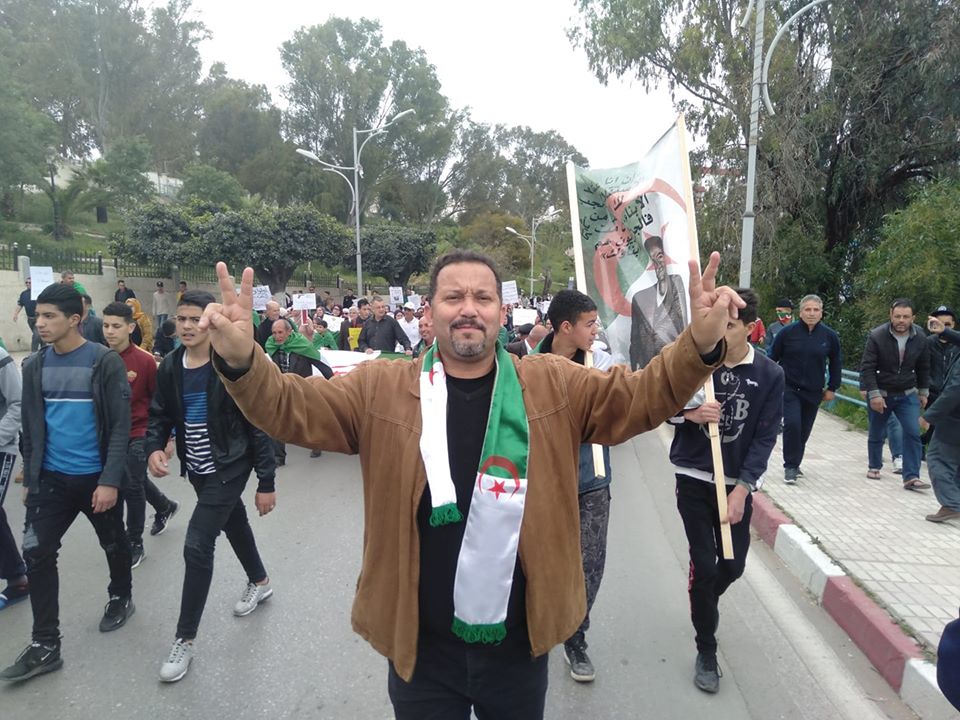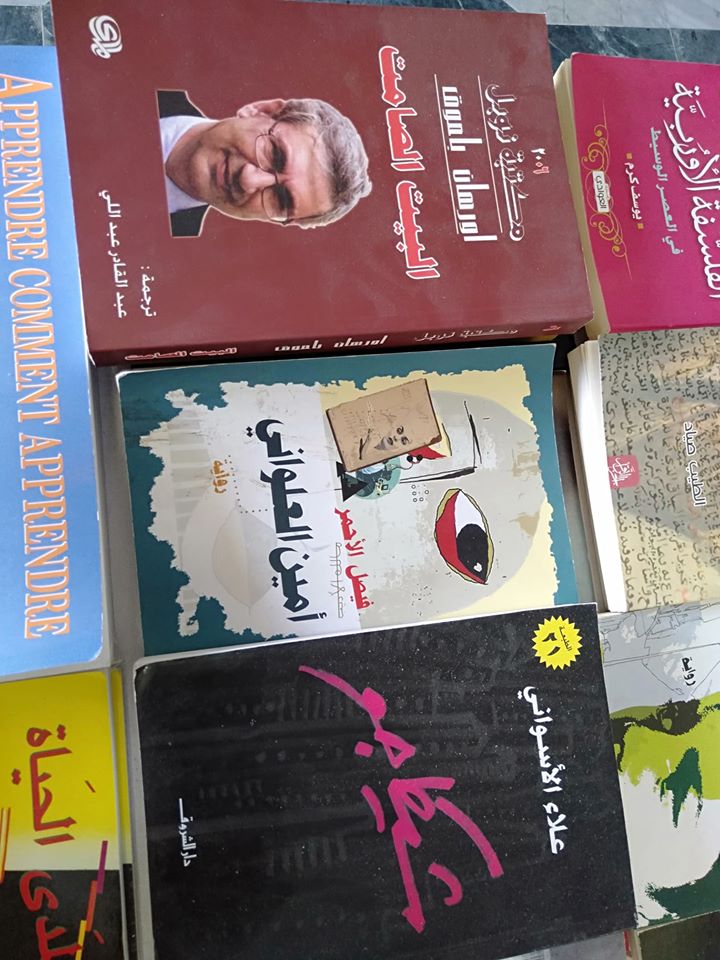
As an SF author, activist and reviewer from the Eastern part of the Arab world, I can’t help but feeling humbled if not downright jealous of what is going on in the Western part of the Arab world, the so-called Maghreb. I say this after reading a novel I’ve been trying to get hold of for way too long – Amin Al-Ulwani by Algerian author and Professor Dr. Faycel Lahmeur. The novel, at first sight, purports to be a futuristic biography of an Algerian author in the future, who goes by the name of Amin Al-Ulwani. He was born in 2017 and the biographer, we presume, is even farther in the future. The novel is the biographer commenting on this big literary figure, with the text interlaced with quips and cuttings and quotes from the writing of Amin Al-Ulwani himself. Not so much passages from his novels but his own commentary about himself, introductions he’d written for novels of his and emails he sent to friends and online postings, as well as reviewers and readers’ comments, notes on research for novels, his responses ot reader responses, and so on and so forth.
By Emad El-Din Aysha, PhD
It’s pastiche to perfection, and as if this isn’t mind-boggling enough, things take a turn for the weirder still when you have a chapter named after Faycel Lahmeur, about a certain phase in the artistic and philosophical development of Amin Al-Ulwani when he became obsessed with an Algerian author in the past by the name of, you guessed it, Faycel Lahmeur. Amin discovers the historical existence of this past author by accident when one of his fans posts a message about a novel written in the past by this Faycel Lameur and wouldn’t you know it again, the novel is called Amin Al-Ulwani!

From Funhouse to Madhouse
Before getting into the nitty gritty of the story let’s talk about what’s really unique, distinct and supercool about the novel itself, the way it’s written especially. Something that’s been said about Arabic science fiction is that it’s lacking in the areas of depth of characterisation, plotting and narrative storytelling. This novel blasts those claims out of the water, although sadly there is a lot of truth to those claims in our Eastern part of the Arab world. Arab SF is still technically in its infancy and doesn’t have a large and well-developed audience and has to put up with a recalcitrant publishing industry and literary establishment and a set of critics waiting to pounce on the genre at the first sign of blood. It’s not that our authors are incapable of dishing up something meaty, sophisticated and substantive it’s that they shy away given the barriers facing them. It seems, then, that Algeria has overcome a number of these problems, thank heavens!
A more subtle problem is that of language. Friends, translating my English SF works to Arabic have had a tough time handling my sense of humour, the way I play on words, and you can’t help but notice how stiff a lot of literary Arabic is in general. Read Amin Al-Ulwani, however, and almost from the first page, and you find humour and sarcasm but all coupled with very high level classical Arabic, almost to the point that you can’t recognise many of the old, old words on display. It seems, again, that here in the Eastern part of the Arab world, the birthplace of classical Arabic, we take our so-called linguistic superiority for granted and don’t bother to check the dictionaries to find the proper terminology for things, forgetting in the process the dramatic and poetical core of Arabic and how amazingly suitable it is for complex topics like science fiction.
The novel is full of pitchy, enjoyable one-liners that are sophisticated and comment either on the person of Amin Ulwani, and how pompous and spoilt he was, or the nature of writing in this future world. One I especially liked is how the only good writing now, thanks to social media, is the kind you find scrawled on the walls of public urinals. These language games are more significant than we think. It shows how up to speed Western Arab authors are with what’s going on in the international domain when it comes to language and writing. But more important still is the fact that it proves that Arabic, classical Arabic, can be a sarcastically humoristic language. So all in all I thoroughly enjoyed the novel, both in terms of content and structure. My only misgiving was that the story ended a bit abruptly with Amin Ulwani feeling that he no longer has any stories left in him as he grew older and that the end was just round the corner. This is a common sentiment among writers and thinkers, mind you, Yukio Mishima for example so it rings true and is evidence of proper plotting and characterisation. Narrative innovation follows that closing off the man’s life since you have a reference list in the next chapter followed by an appendix of key terms in the chapter after that.
You become convinced that you’re reading an actual biography written by someone who actually is living in a technological future where writing is completely different than the way it is now, although the transformation of the writing industry does seem to be going in that direction. Now to get back to the story itself.
A Three Body Problem
The biographer tries to make sense of this and see if this is just a coincidence of names or if Faycel Lahmeur was actually writing about the real person from the future (to him) called Amin Al-Ulwani. It’s not entirely clear what conclusion the nameless biographer reaches (his comments are in footnotes) but you have this amazing chapter divided into little subtitled portions where Amin Al-Ulwani is commenting on Faycel Lahmeur, either the man himself and his times, or his novel on Amin, with the subsequent section being Faycel Lahmeur commenting on the future times and literary works of this nefarious character called Amin Al-Ulwani!
You suspect that behind all this there is a deep and lurking anxiety on the part of Dr. Faycel Lahmeur, wondering about the fate of writing in the future, the very future of the author himself, and if it will be any better or worse than the way things are now. Amin Al-Ulwani is an Algerian alright, but in this penultimate chapter you discover that he was born and grew up in Europe and only visited Algeria on two separate occasions, and didn’t particularly like what he found. Amin Al-Ulwani is privileged in a way that he cannot imagine. Not only did he grow up in a democratic and prosperous part of the world – he was spoilt rotten by his mother, as an only child – but he has technology at his disposal that allows him to cut out the middleman entirely. No editor, no publisher, everything goes online, he makes money as soon as something is posted and read and interacts with his readers’ directly and learns what they want, like and don’t like without an intermediary. He doesn’t even have to scribble things down on a piece of paper or type away on a keyboard. He says it all to a large screen on the wall and it writes up what you say.[1]
Compare that to the utter hell that Faycel Lahmeur has to go through, in the novel. Political censorship enters into everything. The whole process of literary evaluation and prize giving and publishing is corrupt and incompetent, and there’s the general hardships of life. And despite all of this, or because of all this, the man persists and produces literary masterpieces that really change how things are done, if only after the man is retired or dead. (Oh, it’s not clear there either if this is the same Dr. Faycel Lahmeur who wrote the novel I bought or some other fictional Faycel Laymeur that Dr. Faycel dreamed up!)
There’s more going on here than the author, Dr. Faycel, consciously and objectively reflecting on himself. There is genuine futurism going on. Will the author play a role, have a role to play, in a world of non-stop technological progress? The author certainly can play a role, a bigger role than ever before given the absence of political censorship and literary intermediaries, but will he ‘want’ to? Or will he squander the technological gifts at his disposal and just go with the flow? He’s not that different than the Arab intellectual, who compromises on his principles and misleads the masses, all to the benefit of those in power.
You feel, you hope, that this future author by the name of Amin Al-Ulwani learned to appreciate what he has at his disposal and become a better writer after stumbling onto that novel from the Algerian past. (He always refers to Faycel Lahmeur as an African author, not even a ‘North’ African author or an Arab author. He’s that disconnected from his roots, despite his connectivity to the electronic world). This is clearly the most innovatively written novel I’ve read since Philip K. Dick’s Confessions of a Crap Artist. In that novel, one of PKD’s few non-SF novels, you have chapters written in one of three formats. Either it’s written in the third person, focused one character or another, or it’s written in the first-person from the point of view of one character or another. This confused critics, in America at least, but it’s thrilling and helps you understand how PKD struggled with himself, his mental problems and his quest to be a good writer and good person. Struggling also with how people saw him and judged him, or how he thought they saw him. He had to stand out of himself, look at himself from a kind of neutral-objective perspective (third-person), and also from the point of view of his loved ones who were hurting him (first-person other), as well as his own warped perspective and self-justifications (first-person self). The ending is a bit of an anti-climax sadly, but it helped you understand the man more than any of his other novels.
It’s a shame PKD didn’t do this in his SF works, combining incredible technique with the kind of uniquely joyous, satirical and metaphysical worlds he was known for creating. He did that to an extent in A Scanner Darkly but it’s hard to relate to and not enjoyable, a problem fixed in the movie adaptation thankfully. (You can see a similar exercise in self-critique and humility in Terry Gilliam movies, especially the way Jeff Bridges is portrayed in The Fisher King, a talk radio personality struggling between superficial stardom-success and using his profession to really help people). And, as I understand it, PKD was influenced heavily by French literature when he wrote Confessions of a Crap Artist. It just goes to show, again, that the Arab West is far more developed intellectually speaking than us poor Easterners. There’s a chapter where the focus is on a novel by Amin Al-Ulwan and the book is called ‘Language’, and it’s all about language and how languages dictates thought – is thought – and how language so thought has degenerated thanks to the internet. Hence, the quip about public urinals.
The Band Aid of the Spirit
Reading the chapter you can’t help but feel it’s influenced by post-modernism and the end of the divide between author and reader, with the two fusing together through the process of communication as one gets feedback from the other and adapts himself to the preferences of the author. The technique here is called Ulwaniyah[Ulwanism, like Foucauldian or Straussian], a tongue-in-cheek critique of the sorry state of literature and literary criticism, at least in the West. Mr Amin himself, as stubborn and self-obsessed as he is, is always self-consciously modelling himself on past intellectuals and great literary figures, such as Gamal Al-Ghitani, to the point of impersonating them. He has his own obsessions with the past, much as Dr. Faycel Lahmeur has an obsession with the future, as if he’s aware of how facetious and empty modern intellectual life is. The Western world no longer has anything new to contribute, after becoming caved in on itself culturally. Thank heavens then that both Mr Amin and the historical Faycel Lahmeur have an affinity for Sufism as both get inspiration from their dreams.
Even with his location in Europe, Mr Amin can’t keep his religious and cultural heritage at bay. That’s a fitting ending to this review article, if you ask me. The only answer to the spiritual aridity of the overly easy, overly technological world we increasingly live is a contribution from the Orient. Not from the Eastern part of the Arab world, but from the East more generally, in the form of humility and religion and spiritual virtues. If we have to put up with corruption and nepotism in the meantime, so be it. Better than being uneventful. Being stuck in this part of the world myself, and I originally grew up abroad, I’ve found myself increasingly like the hero in Philip K. Dick’s The Man Who Japed, refusing to live in the luxurious off-world colonies and remains on earth in the poverty of the post-nuclear war world. Work is what gives him, his life, meaning.
The historical Faycel Lahmeur of the novel is like that himself, so it’s refreshing to know that there are people like you out there who are fighting back with the pen and I’m glad to say winning too. At least winning as far as the Egyptian publishing industry is concerned. I don’t remember seeing any of Dr. Faycel’s SF works in the Algerian corner of the Cairo International Book Festival!!
NOTES
[1] This just in. Dr. Faycel has just told me that he wrote the novel originally in 1999-2000 and that it was first published in 2007, meaning that he wrote before the current mania with social media and the movement of authors out of publishing and into direct interaction with readers. This is futurism in its purist form, a concrete anticipation of what has actually happened!!





